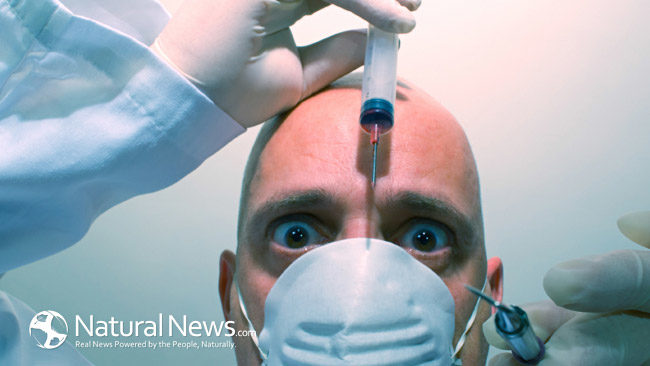If you have visited a dentist and ever been told “You have a cavity” (or anything beyond), chances are that you have had an injectable anesthesia.
As this is such a standard practice, most of us haven’t given much thought to it. After all, dental anesthetic has been used for over 100 years. They must be safe… right?
Up until my dentist visit yesterday I would have said “yes”.
At this particular appointment however, when the needle was being pulled out of my jaw and the injection began to set in – weird would not even begin to describe how I felt.
It was like I was beginning to fade out of the room, I felt dizzy and light. My eyes would not focus and there were doubles, one on top of the other vertically. I debated if I should say something. I decided to just breathe.
After a few minutes the numbness started to kick in and my faculties seemed to return, but that was a very uncomfortable and slightly scary feeling, one which prompted me to do some research on the subject.
I assumed what they had given me was Novocain…
Novocain is a local anesthetic (painkiller) used by doctors and dentists. It was developed as a substitute for cocaine, which was the original dental anesthetic, in 1905 by German researcher Alfred Einhorn. The trade name Novocain came from the Latin word “novus,” meaning “new,” plus “cocaine.” Apparently, however, Novocain has not been common practice to administer for well over 30 years now. What I received was Lidocaine.
Currently the commonly used local anesthetic solutions are:
Lidocaine (Xylocaine)
Used for blocks and infiltrations; however, effectiveness of analgesia is limited and of brief duration.
Contraindications and side effects: Not to be used with antidepressants or MAOI’s – as it may produce prolonged high blood pressure.
-pain
-feeling lightheaded
-euphoria
-shaking
-low blood pressure
-drowsiness
-confusion
-weakness
-blurry
-double vision
-dizziness.
-seizures
-abnormal heart beats
-slow heart beat
-heart block
-severe allergic reactions
-respiratory arrest
-coma
Prilocaine with felypressin
Used for blocks and infiltrations, effective analgesia over 90 minutes.
Side effects:
-Swelling and persistent paresthesia of lips
-excitation
-depression
-restlessness
-anxiety
-dizziness
-tremors
-cardiovascular effects
-allergic-type reactions
-neurological effects
Articaine with epinephrine (Septocaine)
Currently recommended for infiltration only. It is ideal where blocks are contraindicated.
Side effects:
• tongue pain or swelling, mouth sores;
• nausea, vomiting, constipation, diarrhea, upset stomach;
• increased thirst, drooling;
• nervousness, dizziness, drowsiness;
• ear pain, neck pain, joint or muscle pain;
• unusual or unpleasant taste in your mouth;
• numbness or tingly feeling;
• mild skin rash or itching; or runny nose, sore throat.
• Weak or shallow breathing
• slow heart rate, weak pulse;
• feeling like you might pass out;
• swelling in your face;
• swollen or bleeding gums;
• anxiety, confusion, restless feeling, tremors or shaking;
• blurred vision, ringing in your ears; or
• seizure (convulsions).
Bupivacaine (sensorcaine)
Used where up to 8 hours of anesthesia is required – mostly for major surgeries.
Side effects:
• nausea
• vomiting
• headache
• back pain
• dizziness
• problems with sexual function
• weak or shallow breathing
• fast heart rate
• gasping
• feeling unusually hot
• slow heart rate
• weak pulse
• feeling restless or anxious
• ringing in the ears
• metallic taste
• speech problems
• numbness or tingling around your mouth
• tremors
• feeling light-headed
• fainting
• problems with urination
Of course, the majority will not experience anything unusual and this is not a reason to panic.
Dentists are trained doctors and will know how to deal with a reaction if one should occur.
In retrospect, after writing this article I highly advise you to speak up and say something if you begin to experience anything out of the norm …Then calm yourself with breathing.
Make sure to tell your dentist and or hygienist if you are pregnant, on any medications or have any known allergies and that they are clearly listed in your chart.
Sources:
http://www.discoveriesinmedicine.com/Ni-Ra/Novocain.html
http://www.top3dentists.com/blog/2010/11/history-novocaine/
http://directionsindentistry.net/dental-mythbuster-4-dentists-still-use-novocaine/
http://ceaccp.oxfordjournals.org/content/5/3/71.full
http://www.medicinenet.com/lidocaine-injection_local/article.htm
http://www.empr.com/prilocaine-hcl-injection/drug/4026/
http://www.rxlist.com/septocaine-side-effects-drug-center.htm
http://www.rxlist.com/sensorcaine-side-effects-drug-center.htm







